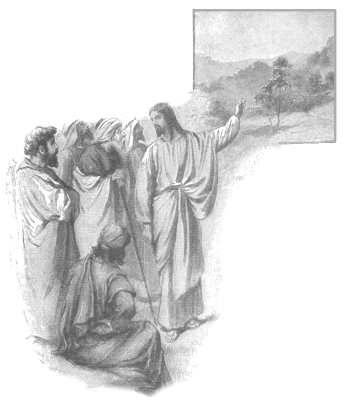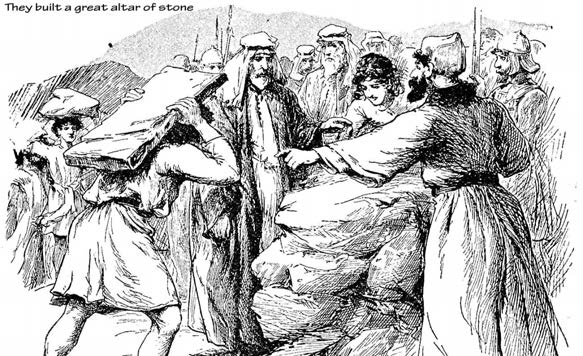google-site-verification: google85f203565cb16b4c.html
Making Better Thought-Movies One Truth At A Time
_________________________________
Misunderstanding
Definition:
 |
1. A failure to understand or interpret correctly. 2. A disagreement or quarrel. |
Is misunderstanding common?
Instant reactions to partial information is very common and cause much grief and hostility. When we do not know the whole story the reactions and emotion are often wrong and dangerous.
It is so easy to jump to false conclusions, then close the mind to any correction, for fear of having "to back down."
Uncorrected information can lead to divorce, broken relationships and many undesirable outcomes.
Jesus with His disciples...
 |
Jesus had to correct His disciples... Luke 19.11 "And because Jesus was nearing Jerusalem, he told a story to correct the impression that the Kingdom of God would begin right away." The disciples were not getting the right message... |
The gathering of the whole assembly at Shiloh preparing to go to war against their brother tribes...

Joshua 22
"Then Joshua called together the tribes of Reuben, Gad, and the half-tribe of Manasseh. 2 He told them, “You have done as Moses, the servant of the Lord, commanded you, and you have obeyed every order I have given you. 3 During all this time you have not deserted the other tribes. You have been careful to obey the commands of the Lord your God right up to the present day. 4 And now the Lord your God has given the other tribes rest, as he promised them. So go back home to the land that Moses, the servant of the Lord, gave you as your possession on the east side of the Jordan River. 5 But be very careful to obey all the commands and the instructions that Moses gave to you. Love the Lord your God, walk in all his ways, obey his commands, hold firmly to him, and serve him with all your heart and all your soul.” 6 So Joshua blessed them and sent them away, and they went home.
7 Moses had given the land of Bashan, east of the Jordan River, to the half-tribe of Manasseh. (The other half of the tribe was given land west of the Jordan.) As Joshua sent them away and blessed them, 8 he said to them, “Go back to your homes with the great wealth you have taken from your enemies—the vast herds of livestock, the silver, gold, bronze, and iron, and the large supply of clothing. Share the plunder with your relatives.”
9 So the men of Reuben, Gad, and the half-tribe of Manasseh left the rest of Israel at Shiloh in the land of Canaan. They started the journey back to their own land of Gilead, the territory that belonged to them according to the Lord’s command through Moses.
The Eastern Tribes Build an Altar
10 But while they were still in Canaan, and when they came to a place called Geliloth near the Jordan River, the men of Reuben, Gad, and the half-tribe of Manasseh stopped to build a large and imposing altar.
11 The rest of Israel heard that the people of Reuben, Gad, and the half-tribe of Manasseh had built an altar at Geliloth at the edge of the land of Canaan, on the west side of the Jordan River. 12 So the whole community of Israel gathered at Shiloh and prepared to go to war against them. 13 First, however, they sent a delegation led by Phinehas son of Eleazar, the priest, to talk with the tribes of Reuben, Gad, and the half-tribe of Manasseh. 14 In this delegation were ten leaders of Israel, one from each of the ten tribes, and each the head of his family within the clans of Israel.
15 When they arrived in the land of Gilead, they said to the tribes of Reuben, Gad, and the half-tribe of Manasseh, 16 “The whole community of the Lord demands to know why you are betraying the God of Israel. How could you turn away from the Lord and build an altar for yourselves in rebellion against him? 17 Was our sin at Peor not enough? To this day we are not fully cleansed of it, even after the plague that struck the entire community of the Lord. 18 And yet today you are turning away from following the Lord. If you rebel against the Lord today, he will be angry with all of us tomorrow.
19 “If you need the altar because the land you possess is defiled, then join us in the Lord’s land, where the Tabernacle of the Lord is situated, and share our land with us. But do not rebel against the Lord or against us by building an altar other than the one true altar of the Lord our God. 20 Didn’t divine anger fall on the entire community of Israel when Achan, a member of the clan of Zerah, sinned by stealing the things set apart for the Lord? He was not the only one who died because of his sin.”
21 Then the people of Reuben, Gad, and the half-tribe of Manasseh answered the heads of the clans of Israel: 22 “The Lord, the Mighty One, is God! The Lord, the Mighty One, is God! He knows the truth, and may Israel know it, too! We have not built the altar in treacherous rebellion against the Lord. If we have done so, do not spare our lives this day. 23 If we have built an altar for ourselves to turn away from the Lord or to offer burnt offerings or grain offerings or peace offerings, may the Lord himself punish us.
24 “The truth is, we have built this altar because we fear that in the future your descendants will say to ours, ‘What right do you have to worship the Lord, the God of Israel? 25 The Lord has placed the Jordan River as a barrier between our people and you people of Reuben and Gad. You have no claim to the Lord.’ So your descendants may prevent our descendants from worshiping the Lord.
26 “So we decided to build the altar, not for burnt offerings or sacrifices, 27 but as a memorial. It will remind our descendants and your descendants that we, too, have the right to worship the Lord at his sanctuary with our burnt offerings, sacrifices, and peace offerings. Then your descendants will not be able to say to ours, ‘You have no claim to the Lord.’
28 “If they say this, our descendants can reply, ‘Look at this copy of the Lord’s altar that our ancestors made. It is not for burnt offerings or sacrifices; it is a reminder of the relationship both of us have with the Lord.’ 29 Far be it from us to rebel against the Lord or turn away from him by building our own altar for burnt offerings, grain offerings, or sacrifices. Only the altar of the Lord our God that stands in front of the Tabernacle may be used for that purpose.”
30 When Phinehas the priest and the leaders of the community—the heads of the clans of Israel—heard this from the tribes of Reuben, Gad, and the half-tribe of Manasseh, they were satisfied. 31 Phinehas son of Eleazar, the priest, replied to them, “Today we know the Lord is among us because you have not committed this treachery against the Lord as we thought. Instead, you have rescued Israel from being destroyed by the hand of the Lord.”
32 Then Phinehas son of Eleazar, the priest, and the other leaders left the tribes of Reuben and Gad in Gilead and returned to the land of Canaan to tell the Israelites what had happened. 33 And all the Israelites were satisfied and praised God and spoke no more of war against Reuben and Gad.
34 The people of Reuben and Gad named the altar “Witness,” for they said, “It is a witness between us and them that the Lord is our God, too.”
In the 22nd chapter of Joshua,
the campaign to conquer the Promised Land has been completed. It is worth the time to read the whole chapter...
So what do they do when they first set foot in their newly-blessed territory? They made an altar...
And why not?
It was exactly what they had seen Joshua do when they first entered the Promised Land. It’s the same kind of thing that happened right after the miraculous crossing of the Jordan river (Joshua 4.9) and when the Covenant was renewed on Mount Ebal, following the victories over Jericho and Ai (Joshua 8.30) — not to mention all the other piles of rocks that were intended to serve as reminders to the people of Israel. Rock altars were the known and common tradition.
However, for whatever reason — perhaps by seeds of distrust, “sibling rivalry,” or just some other piece of misinformation that got out of control — the other
9½ tribes of Israel automatically assumed that they were up to
no good: that they were abandoning the LORD and resorting to idol
worship. As soon as they observed the altar being built, they prepare for
war! But they were wrong!
The one group were doing everything they could think of to preserve their relationship with the LORD and make sure they wouldn’t just drift away into idolatry.
Likewise, the other group were just doing everything in their power to preserve the worship of the LORD in Israel and make sure that their kinsmen wouldn’t just drift away into idolatry.
The main problem was simply miscommunication! They misunderstood each other, and they miscommunicated their motives to each other, and thus they brought themselves to the brink of civil war — over nothing but misunderstanding and miscommunication.
Fortunately, before the war started they wisely tried to find out what was going on.
They went in
with words before they went in with swords. This is where we fail. We go in with the "swords" first...
Fortunately, they were able to listen well to each other's concerns and respond with important reassurances.
In actual fact - they weren’t turning their backs on the LORD at all.
In truth, their motives were exactly the opposite of what the other tribes had wrongly assumed.
How did they solve this misunderstanding?
- They decided to check out the facts before going to war
- They communicated with each other
- They were open to "listen" to what the other party was saying
- The were convinced that it was a misunderstanding, caused by fear
- They communicated openly and solved all the issues
 |
1 Corinthians 13.12 "Now we see things imperfectly, like puzzling reflections in a mirror, but then we will see everything with perfect clarity. All that I know now is partial and incomplete, but then I will know everything completely, just as God now knows me completely." |
Return to bible verses list of problems
Making Better Thought-Movies One Truth At A Time
_________________________________
Bible Study Lessons
- Abandonment
- Abilities
- Abortion
- Abuse
- Addiction
- Accusations
- Adultery
- Anger
- Apathy
- Ashamed
- Attitudes
- Backsliding
- Betrayal
- Bitterness
- Born Again
- Chance
- Conscience
- Deceit
- Deception
- Discipline
- Discretion
- Eyes of GOD
- False Witness
- Fear of the Lord
- Fear -Lord #2
- Flattery
- Friendship
- Fool, A
- Foolishness
- Forgiveness
- Giving
- Inheritance
- Injustice
- Instruction
- Judgment
- Kindness
- Knowledge
- Lawlessness
- Lies, Lying
- Misunderstand
- Pleasure
- Pride
- Problems
- Soft Answers
- Speech
- Understanding
- Vengeance
- Wisdom

Parables by Jesus
- Children of Bridechamber
- New Patch, Old Garment
- New Wine, Old Wineskins
- Treasures Old and New
- Spontaneous Growth
- Mustard Seed
- The Leaven
- Hidden Treasure
- Pearl of Great Price
- Dragnet
- The Soils
- Children at Play
- Wise and Foolish Builders
- The Wheat and the Tares
- Empty House
- Uncompleted Tower
- Rash King's Warfare
- Chief Seats
- Pharisee and Publican
- Two Debtors
- Unmerciful Servant
- Barren Fig Tree
- Bond Servant
- Unjust Steward
- Rich Fool
- Rich Man and Beggar
- Good Samaritan
- Laborers and the Hours
- Friend at Midnight
- Importunate Widow
- Lost Sheep
- Lost Coin
- Prodigal Son
- Elder Brother
- Two Sons
- Cruel Vine-Dressers
- Rejected Cornerstone
- Great Feast
- Wedding Robe
- Wise and Foolish Virgins
- Talents
- Good Shepherd